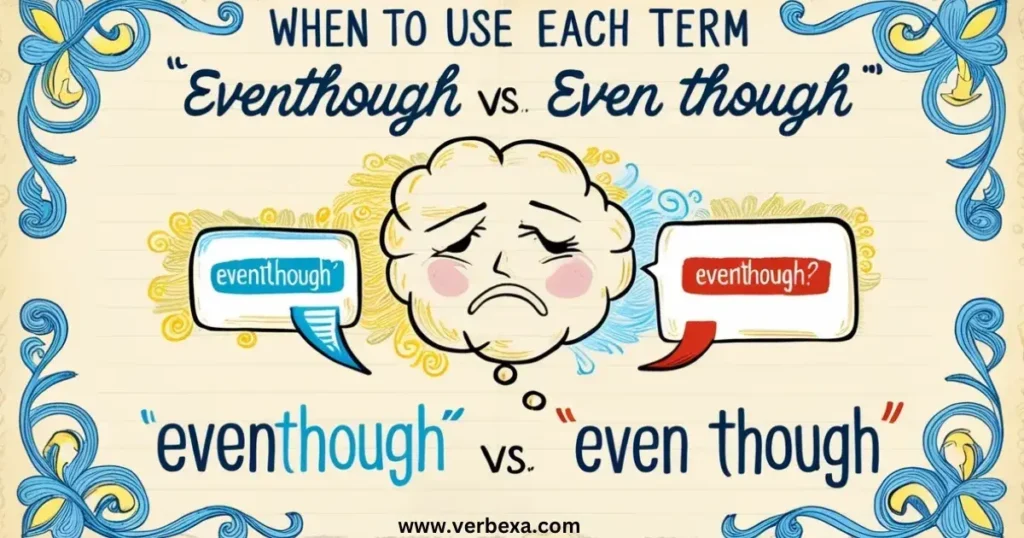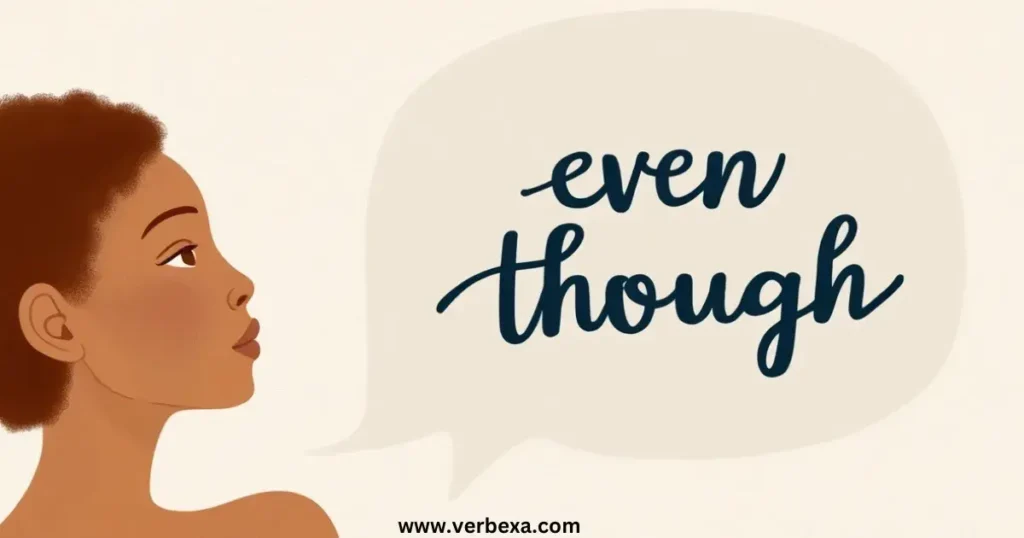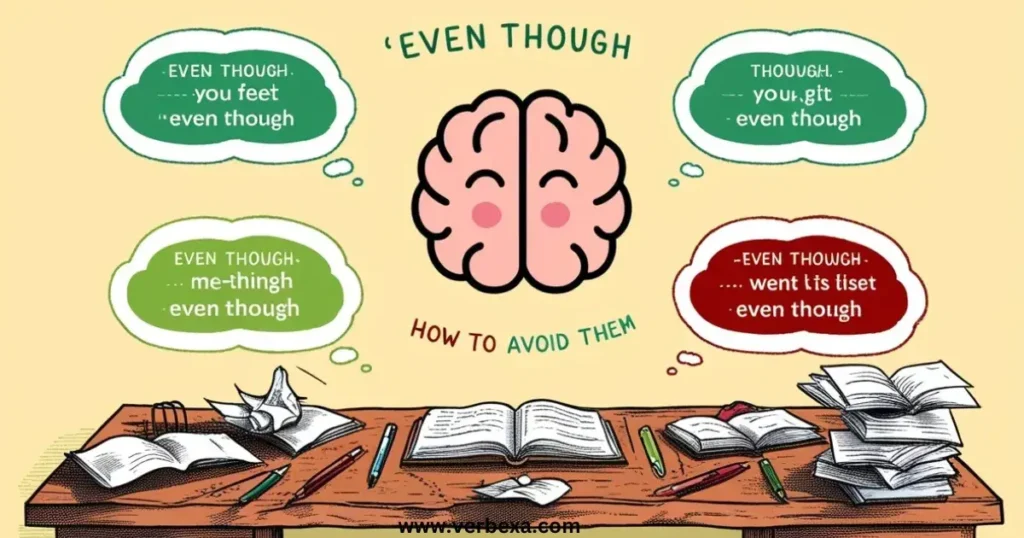Language can be tricky, and in English, many words are prone to confusion. One common confusion involves the terms “eventhough vs even though.” Though these two may appear quite similar at first glance, they are not interchangeable. The first one, eventhough, is actually a misspelling, while the latter, even though, is the correct term and a vital part of grammar. Misunderstanding the difference can lead to errors in writing and speaking, which could affect the clarity of your message.
In this article, we’ll explore the differences between eventhough or even though and help you understand when to use each correctly. We’ll explain their usage, clarify the reasons behind their confusion, and provide actionable examples. Additionally, we will dive into the grammar rules, examples, and even some common exercises to ensure you understand the correct usage of even though or eventhough. After reading, you can confidently use “even though” in your speech and writing without hesitation.
Let’s take a deep dive into this topic and ensure you’re armed with the knowledge to avoid these simple but crucial mistakes.
Definitions and Usage: What Does Each Term Mean?
What is “Even Though”?

“Even though” is a conjunction used in complex sentences to introduce a subordinate clause that shows contrast or contradiction. It signals that, despite the expectation set by the main clause, the result is unexpected or surprising. This conjunction often highlights a concession, such as a situation where one thing is true despite the existence of another, opposing fact.
Let’s break it down with an example:
Example:
- “Even though it was late, we decided to go for a walk.”
- “She passed the exam even though she didn’t study.”
In this sentence, “even though” is used to show that, despite the lateness, the decision to walk was made. The expectation is that being late would discourage the walk, but the outcome is different.
In a grammatical context, “even though” is commonly followed by a dependent clause, which cannot stand alone as a complete sentence. The main clause can stand alone, but the dependent clause needs the main clause to make sense.
What is “Eventhough”?
“Eventhough” is a misspelling of the correct term “even though.” People often combine the two words out of habit or in an attempt to simplify the phrase. However, it’s essential to understand that “eventhough” is not a word in the English language and does not have any formal usage.
For instance, consider this example of incorrect usage:
- “Eventhough the exam was challenging, he managed to pass.”
The correct form should be:
- “Even though the exam was challenging, he managed to pass.”
The error here comes from combining “even” and “though” into a single word. It’s easy to make this mistake, but it’s crucial to know that “eventhough” is not acceptable in standard grammar.
Synonyms for “Even Though”
Sometimes, using different words to convey the same idea can enhance the flow of your writing. Here are 10 synonyms or phrases you can use instead of “even though”:
Synonyms for “Even Though”:
- Although
- Though
- Despite
- In spite of
- Notwithstanding
- Regardless
- While
- Nevertheless
- Still
- Yet
Each of these expressions can often be used interchangeably with “even though” depending on the context. However, some may have subtle differences in meaning or tone, so it’s crucial to choose the best synonym based on the sentence structure.
For example:
- “Although it was raining, they went outside.”
- “Despite the cold, he kept running.”
In some cases, you might choose one synonym over another based on the tone of your writing. While “even though” is slightly more conversational, words like “notwithstanding” may be reserved for more formal contexts.
“Although” vs. “Even Though” in Different Contexts: A Comparison of Usage and Formality

Both “although” and “even though” are used to introduce a contrast or concession within a sentence, but there are subtle differences in their usage and formality that can affect when and how to use them. Let’s break it down:
“Although”: More Formal and Versatile
Although is one of the most common conjunctions used to express contrast. It’s a bit more formal than “even though” and is often preferred in professional or academic writing. You can use although in a variety of contexts without sounding overly casual or conversational.
Examples:
- Formal: “Although the project was difficult, the team completed it on time.”
- Academic/Professional: “Although the evidence supports the hypothesis, further research is necessary.”
While “although” can be used in spoken English, it is generally more suited to written communication where a slightly more polished tone is required.
“Even Though”: Slightly More Informal and Emphasized
Even though tends to be slightly less formal than “although”, making it a great option for informal speech or writing. It often adds a bit more emphasis to the contrast. It’s ideal when you want to highlight the contradiction or surprising nature of the statement more strongly than “although” might convey.
Examples:
- Conversational: “Even though it was raining, we decided to go hiking.”
- Casual Writing: “Even though he was tired, he stayed up late to finish the work.”
In many situations, “even though” can be used interchangeably with “although”, but it can make the sentence feel a bit more emotional or dramatic because of the stronger emphasis on the unexpected outcome.
When to Use “Though” as a Standalone Word or Conjunction
The word “though” can be used both as a conjunction and a standalone word in different contexts, but its placement and usage vary depending on the formality and tone of your sentence.
As a Conjunction: Slightly Less Formal, but Still Acceptable
When used as a conjunction, though is similar to “although” or “even though”, but it is more conversational. It is especially useful when you want to add a contrast at the end of a sentence or after a short phrase.
Examples:
- “It was cold, though I still went for a run.”
- “She likes to cook, though she doesn’t do it often.”
Though at the end of a sentence feels casual and is more typical in informal speech or writing. It adds contrast, but it is less formal than using “although” or “even though” at the beginning of a sentence.
As a Standalone Word: To Add Contrast or a Qualifying Statement
As a standalone word, though can serve as a way to qualify or soften a statement, often with a more casual tone.
Examples:
- “I thought the movie was good. It was a little long, though.”
- “She didn’t go to the party. She might go later, though.”
In these cases, though is used informally to acknowledge a contradiction or to add a contrast at the end of a sentence. It makes the conversation sound more natural and less rigid compared to using a more formal conjunction.
Comparison Table: Eventhough Vs Even Though
To make it easier to understand the differences, let’s break down the comparison between eventhough and even though in the following table:
| Aspect | Even Though | Eventhough |
|---|---|---|
| Correctness | Grammatically correct | Incorrect, misspelling |
| Usage | Used in complex sentences for contrast or contradiction. | Not a valid term in English grammar. |
| Function | Conjunction linking a main clause and a subordinate clause. | No legitimate grammatical function. |
| Example | “Even though he was tired, he finished the project.” | “Eventhough he was tired…” (incorrect) |
| Synonyms | Although, though, despite, in spite of, etc. | None (since it’s a misspelling). |
As you can see, there’s a significant difference between the two terms. Using “eventhough” is grammatically incorrect, and you should always opt for “even though” to maintain proper language structure.
When to Use Each Term: Eventhough Vs Even Though

Now that we’ve understood the distinctions, it’s essential to know when to use “even though” correctly in your speech and writing.
When to Use “Even Though”:
- Use “even though” when you want to introduce a contrast in a complex sentence.
- It’s used when there is a contradiction or an unexpected outcome.
- Commonly used in both formal and informal contexts, though more formal alternatives like “although” might be preferred in certain professional settings.
Examples:
- “Even though we were exhausted, we finished the race.”
- “Even though I don’t believe in God, we pray eventhough we don’t believe in god during religious festivals.”
Note: In the second example, “even though” is correctly used to highlight a contrast between personal beliefs and the act of praying.
Avoid Using “Eventhough”:
Simply put, never use “eventhough.” This is a misspelling, and it’s not recognized in English grammar. If you accidentally use it in writing, the best course of action is to correct it to “even though.” Mistakes like these can be easily avoided by double-checking your writing or using grammar-checking tools.
Grammar Tips: Avoiding Common Mistakes with “Even Though”
To ensure you’re consistently using “even though” correctly, here are some grammar tips to remember:
1. Sentence Structure
Use “even though” to connect a dependent clause with an independent clause. Ensure that the dependent clause contrasts the main idea of the independent clause.
Example:
- “Even though it was raining, we decided to go for a walk.”
Notice how the dependent clause “Even though it was raining” introduces a contrast to the main clause “we decided to go for a walk.”
2. Watch for Comma Usage
When “even though” is placed at the beginning of a sentence, it should be followed by a comma to separate it from the main clause.
- Correct: “Even though it was late, we stayed up to finish the project.”
- Incorrect: “Even though it was late we stayed up to finish the project.”
3. Avoid Common Mistakes
Sometimes people mistakenly use “eventhough” when they mean “even though.” This is one of the most common grammatical errors people make. Always be aware of this issue and take extra care when writing.
Even Though Vs Eventhough Exercises
Here are some exercises to help you practice distinguishing between “eventhough” and “even though”. Fill in the blanks with the correct term.
Exercise 1: Fill in the Blank
- ______ he didn’t study, he still passed the test.
- She arrived early, ______ the traffic was terrible.
- We went hiking, ______ the weather forecast predicted rain.
Answers:
- Even though
- Even though
- Even though
Exercise 2: Correct the Sentences
- Eventhough it was late, they went out.
- We stayed inside, eventhough it was hot outside.
- Eventhough I was tired, I finished the task.
Corrected Sentences:
- Even though it was late, they went out.
- We stayed inside, even though it was hot outside.
- Even though I was tired, I finished the task.
Pronunciation of “Even Though”

The pronunciation of “even though” can be tricky for English learners, particularly because of its rhythm and the sounds that appear in quick, connected speech. Getting the pronunciation right is important for both clear communication and understanding in everyday conversations, as well as in formal or academic settings.
How to Pronounce “Even Though” Correctly
Let’s break down the pronunciation of “even though” into manageable parts:
- “Even” /ˈiː.vən/
- The first syllable is pronounced like the long “ee” sound, as in the word “see”.
- The second syllable is softer, pronounced like “vuhn”.
- Together: “EE-vuhn”.
- “Though” /ðoʊ/
- The word “though” starts with the voiced dental fricative sound /ð/, which is the sound you make when you place your tongue lightly against your upper teeth (like in the words “this” or “that”).
- The “o” is pronounced as a long “o” /oʊ/, like in “go”.
- Together: “th-oh”.
When spoken together, “even though” sounds like:
/ˈiː.vən ðoʊ/ – “EE-vuhn th-oh”.
Common Mispronunciations and How to Avoid Them
Even though the pronunciation of “even though” may seem straightforward, there are a few common mispronunciations to be aware of. Let’s cover them and how to correct them:
- Mispronouncing “Even” as “Evun”
- Mistake: Some speakers might shorten the word “even” to “evun,” pronouncing it like /ˈɛvən/.
- Correction: The word should sound more like “EE-vuhn” — with a clear long “e” sound at the beginning.
- Forgetting the “th” Sound in “Though”
- Mistake: Non-native speakers sometimes pronounce “though” as “t-ow” or “th-ow,” forgetting to create the soft “th” sound.
- Correction: The sound should be the voiced dental fricative /ð/, similar to the “th” sound in “this” or “that.” Practice by placing your tongue between your teeth and gently exhaling as you say “though.”
- Over-emphasizing “Though”
- Mistake: Some people stress the second word, “though,” too much, making it sound louder or longer than it should be.
- Correction: In “even though,” “even” should receive a slight stress, while “though” is lighter and faster. Focus on blending the words smoothly.
- Omitting the ‘v’ Sound in “Even”
- Mistake: The “v” in “even” is sometimes skipped or mispronounced as a “w” sound, especially in casual speech.
- Correction: Make sure to pronounce the “v” sound as in “very” or “vivid”. This is an important part of the word.
Tips for Mastering the Sound of “Even Though”
- Slow It Down: When learning the pronunciation, practice slowly, separating the syllables: EE-vuhn th-oh. Once you are comfortable, gradually speed up to a natural pace.
- Focus on the “th” Sound: The “th” sound can be challenging. Practice by saying words like “this,” “that,” “there,” or “though” repeatedly. Remember, your tongue should gently touch the upper teeth when producing this sound.
- Watch Native Speakers: Listen to native speakers and mimic their speech. Pay attention to how they connect the words smoothly. Watching videos with subtitles or using language-learning platforms can help you hear the correct pronunciation and rhythm.
- Use a Mirror: When practicing the “th” sound, use a mirror to ensure your tongue is in the right position. This will help you avoid mistakes like misplacing the tongue or over-exaggerating the sound.
Can You Use “Even Though” in Academic Writing?

In academic writing, tone and formality play a significant role in shaping the clarity and professionalism of your work. Understanding when to use specific conjunctions like “even though” is important in maintaining an appropriate tone. While “even though” is widely used in everyday speech and informal writing, its usage in more formal contexts like essays, reports, or professional writing requires careful consideration.
Let’s take a deeper look into whether and how “even though” can be used in academic writing.
Formality of “Even Though” in Academic Writing
“Even though” is a slightly informal conjunction, often used in casual speech or conversational writing. While it is not strictly incorrect to use it in academic essays or research papers, it is generally less formal than other alternatives such as “although” or “despite.” In most academic contexts, where precision and professionalism are key, “although” is preferred due to its more neutral tone.
When It’s Okay to Use “Even Though”
Despite being slightly less formal, “even though” can still be used in academic writing under certain conditions. Its usage is best suited when the contrast or concession being made carries a sense of unexpectedness or emphasis. In these cases, “even though” can help convey a more expressive or dramatic contrast.
For instance, if you are discussing results or conclusions that challenge expectations, “even though” can be effective in highlighting the surprise element of your statement.
Example in Academic Context:
- “Even though the study was limited, it provides valuable insights into the behavior of the participants.”
In this example, “even though” emphasizes the unexpected nature of the study’s contribution despite its limitations. It effectively draws attention to the contrast between the limitations and the insight provided by the research.
When to Avoid “Even Though” in Academic Writing
On the other hand, if you are aiming for a more neutral or formal tone in your academic writing, it’s often better to use alternatives like “although” or “despite”. These expressions are widely regarded as more appropriate for professional or academic contexts, where precision and clarity are crucial.
For example, in the same context above, “although” might be a better fit:
- “Although the study was limited, it provides valuable insights into the behavior of the participants.”
This sentence sounds more neutral, without the emotional emphasis that “even though” might convey. By choosing “although,” the writer maintains a more formal tone without diminishing the impact of the contrast.
“Even Though” vs. More Formal Alternatives
- “Although”:
- Formality: Slightly more formal than “even though” and widely used in academic writing.
- Usage: Best used when the contrast being introduced does not require extra emphasis or dramatic flair. It works in both formal essays and professional reports.
- Example: “Although the study had certain limitations, the findings are still significant.”
- “Despite”:
- Formality: The most formal of the three options.
- Usage: “Despite” is used in a similar way to “even though”, but it is followed by a noun or gerund rather than a full clause.
- Example: “Despite the limitations of the study, it provides valuable insights.”
- “In Spite of”:
- Formality: Similar in formality to “despite” and interchangeable in many cases.
- Usage: Also requires a noun or gerund following it.
- Example: “In spite of the limitations, the research was able to uncover significant trends.”
In comparison to “even though”, both “despite” and “in spite of” are more neutral and formal choices that are ideal for academic writing. They help maintain a professional tone while expressing contrast.
Best Practices for Using “Even Though” in Academic Writing
To effectively use “even though” in academic writing, follow these best practices:
- Emphasize Contrasts with a Stronger Effect: Use “even though” when you need to emphasize the contrast or when you want the reader to focus on an unexpected outcome. This can be effective when discussing surprising results or conclusions in a research paper.
- Avoid Overuse: While it’s okay to use “even though” in an academic context, don’t overuse it. Relying too heavily on “even though” may make your writing sound overly conversational or casual.
- Consider the Tone of Your Paper: If you’re writing a formal essay or research report, consider replacing “even though” with “although” or “despite” to maintain a neutral and professional tone.
- Use It Correctly in Complex Sentences: Ensure that you use “even though” to introduce a subordinate clause (a clause that cannot stand alone) and that the main clause follows it.
- Correct: “Even though the experiment was limited, the results were noteworthy.”
- Incorrect: “Even though the experiment, the results were noteworthy.”
Common Mistakes with “Even Though” and How to Avoid Them

The conjunction “even though” is a useful tool for expressing contrast in English, but it’s easy to make mistakes when using it. Whether it’s misplacing it in a sentence, using the incorrect spelling, or overusing it, these mistakes can make your writing and speech less clear. In this section, we’ll highlight some of the most common mistakes people make with “even though” and provide tips on how to avoid them.
Misplacing “Even Though” in Sentences
One of the most common mistakes people make is misplacing “even though” within a sentence. This typically happens when writers don’t structure their sentences properly, which can cause confusion or make the sentence sound awkward.
Mistake: Misplacing the Conjunction
- Incorrect: “I went to the park, even though was raining.”
- Correct: “I went to the park, even though it was raining.”
In the incorrect version, the sentence fails to include the subject “it”, which makes the phrase incomplete. “Even though” should be followed by a subject and verb that form a complete subordinate clause.
Tip: Ensure that when you use “even though”, you follow it with a complete clause (subject + verb). This way, your sentence remains grammatically correct.
Incorrectly Using “Eventhough” as a Single Word
Another common mistake is spelling “even though” incorrectly as a single word, “eventhough.” This misspelling is a frequent error, especially in informal writing or when typing quickly.
Mistake: Writing “Eventhough” as One Word
- Incorrect: “Eventhough I was tired, I finished the project.”
- Correct: “Even though I was tired, I finished the project.”
Eventhough is not a valid word in English. Always use the two-word form: “even though.”
Tip: If you’re unsure whether a word is a compound, double-check its spelling. “Even though” should always remain two separate words.
Overusing “Even Though” When “Although” Would Be Better
While “even though” is often used interchangeably with “although,” there are times when “although” would be the more appropriate choice, especially in formal writing or when you want a more neutral tone.
Mistake: Overusing “Even Though” in Formal Writing
- Incorrect: “Even though the report is long, it provides a lot of valuable information.”
- Correct: “Although the report is long, it provides a lot of valuable information.”
In formal or academic contexts, “although” is preferred over “even though” because it sounds more neutral and professional.
Tip: Use “although” when you want to keep your tone formal and more neutral. Use “even though” when you want to emphasize the contrast or add a bit more dramatic flair to your statement.
Failing to Use Commas Correctly with “Even Though”
When “even though” is used at the beginning of a sentence, it requires a comma afterward to separate the introductory clause from the main clause. A common mistake is forgetting this comma.
Mistake: Not Using a Comma After “Even Though”
- Incorrect: “Even though it was late we decided to go for a walk.”
- Correct: “Even though it was late, we decided to go for a walk.”
Without the comma, the sentence feels a bit rushed or hard to follow. A comma after “even though” helps clarify the structure and flow.
Tip: Always use a comma after “even though” when it starts a sentence. If the phrase is in the middle of the sentence, no comma is needed unless the clauses are long or complex.
Misusing “Even Though” in Simple Sentences
Sometimes, “even though” is misused in simple sentences where it’s unnecessary. This often happens when writers mistakenly insert “even though” instead of using a simpler conjunction like “but” or “although.”
Mistake: Using “Even Though” in a Simple Contrast
- Incorrect: “I am tired even though, I want to go for a run.”
- Correct: “I am tired, but I want to go for a run.”
Even though implies a more complex contrast and should be used for more complicated or unexpected relationships. For a simple contrast, a basic conjunction like “but” is more appropriate.
Tip: If the contrast is simple, use conjunctions like “but,” “although,” or “yet” instead of “even though.”
Using “Even Though” to Express Contrast with “Despite” or “In Spite of”
Sometimes, people mistakenly use “even though” when they should be using “despite” or “in spite of.” These are used differently because they don’t require a full clause after them, unlike “even though.”
Mistake: Using “Even Though” Where “Despite” Should Be Used
- Incorrect: “Despite it was raining, we went outside.”
- Correct: “Even though it was raining, we went outside.”
- Incorrect: “In spite of being tired, even though I finished the task.”
- Correct: “In spite of being tired, I finished the task.”
Here, “despite” and “in spite of” don’t need a complete clause; they’re followed by a noun or gerund (a verb form ending in -ing).
Tip: Use “despite” or “in spite of” when the contrast is followed by a noun or gerund. Use “even though” when the contrast involves a complete clause.
Overusing “Even Though” for Emphasis
Because “even though” has a strong emphasis on contrast, writers sometimes use it too often to add drama or weight to sentences that don’t need it.
Mistake: Overusing “Even Though” for Emphasis
- Incorrect: “Even though the movie was long, even though it was boring, we stayed until the end.”
- Correct: “Although the movie was long and boring, we stayed until the end.”
In this example, the repetition of “even though” is unnecessary and makes the sentence feel redundant.
Tip: Use “even though” sparingly. If the sentence already contains a strong contrast, avoid using it multiple times in the same sentence.
Conclusion: Final Thoughts on “Eventhough Vs Even Though”
Understanding the difference between “eventhough vs even though” is crucial for your writing and speaking clarity. Remember, “eventhough” is a common misspelling and not a proper word, while “even though” is the grammatically correct conjunction used to express contrast and contradiction.
By using “even though” in the right way, you’ll improve your sentence structure, enhance your writing skills, and communicate more effectively. Avoiding errors like using “eventhough” will help your writing sound more polished and professional, whether it’s in academic essays, casual conversations, or professional communications.
The key is to practice and stay mindful of the correct usage. So, go ahead—use “even though” with confidence, and steer clear of “eventhough”.
Feel free to leave any questions or examples you might have in the comments below! Let’s keep learning and improving our grammar skills together.

This author is a passionate linguist and grammar enthusiast, dedicated to helping individuals master the art of language. With years of experience in teaching and editing, she brings clarity and precision to every sentence. Tina’s mission is to empower writers of all levels to express themselves with confidence and excellence.

![Eventhough Vs Even Though: Correct Usage + Examples [2025]](https://verbexa.com/wp-content/uploads/2025/01/eventhough-vs-even-though-correct-usage-examples-2025.webp)